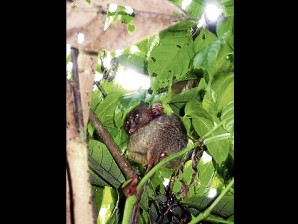DENR puts tarsier on adoption list
TAGBILARAN CITY, Philippines—The world’s smallest primate is up for adoption. The Philippine Tarsier has been identified by the Department of Environment and Natural Resources (DENR) as among the 1,197 wildlife species eligible for adoption under the Adopt-A-Wildlife Species (AAWS) program.
The primate was adopted by Cemex Philippines Inc. through an agreement signed in June last year.
“We chose to adopt the tarsiers not only to save them from extinction but also to spread awareness of their situation, and build understanding of conservation efforts in general,” says Darwin Mariano, executive director of the Cemex Philippines Foundation.
Although the tarsiers are not yet categorized as vulnerable, endangered or critically endangered, they may qualify as such within five years if nobody protects it, says Agnes Payson, operations director of the Conservation International Philippines (CI Philippines).
Dwindling number
The Bohol-based Philippine Tarsier Foundation Inc. estimates that only 1,000 tarsiers thrive in the hills of Corella town in Bohol, a far cry from their number years ago.
Studies showed the tarsiers could be found in the forests of Samar, Leyte and Bohol, although Bohol is the more famous destination for tarsier viewing as the activity is managed by the local government.
The tarsier is 3-6 inches long and weighs 3-6 ounces. Its tail is 5-11 inches long.
Tarsiers are most active in dusk and dawn. They mate once a year—one night on a full moon. The female gives birth to only one infant at a time.
The animals can live 20 years in the wild and up to 13 years in captivity.
Priority species list
Under the AAWS program, the adoption of nonthreatened species is allowed upon DENR approval from its priority list of 21 insects, 53 amphibians, 27 reptiles, 137 birds, 86 mammals and 873 plants.
Some of the endangered species include the Philippine Crocodile, Philippine Eagle, tamaraw and waling-waling orchid.
A species may be adopted in three ways: directly implementing a wildlife conservation project, providing financial resources for the implementation of a new or chosen project, or donating funds to an existing species conservation program.
In the case of Cemex, Mariano said the group chose to provide final resources and partner with both the DENR and CI Philippines to ensure the success of the conservation effort.
“This program allows private funders like us to work together with the DENR and groups like CI to ensure a scientific approach to conservation … and ensures that our expenditure actually makes an impact,” Mariano says.
Partnership
The partnership program has three phases.
Cemex donated P1.5 million to fund the first phase, which begins with research on tarsier population and distribution. It will run for one year.
The second phase, which will run for two years, involves pilot-testing the conservation stewardship program and engagement with stakeholders.
The third, which will run for three years, will establish partnership with local government units, nongovernment organizations and the academe.
Payson said the final phase would also delve on replicating the experience in other critical habitats and sustaining financing arrangements.
‘Butanding’ deal
Adoption is not new to Cemex as it started its own AAWS program in 2007 with the butanding (whale shark) to save its population and protect its habitat.
Ruth Tawantawan, technical director for the Parks, Wildlife and Coastal Zone Management Sector of DENR in Central Visayas, describes the Cemex deal as a testament to the viability of public-private partnership.
Under the agreement, the DENR, through its offices in Central and Eastern Visayas, will facilitate the issuance of permits and certifications, and monitor and evaluate the implementation of the project.
